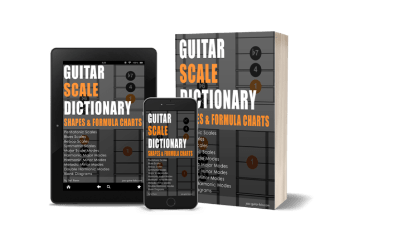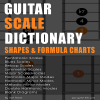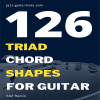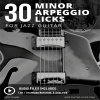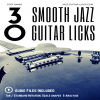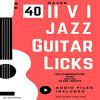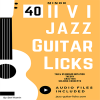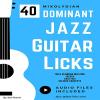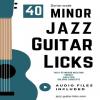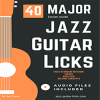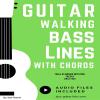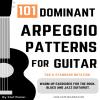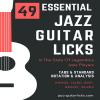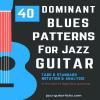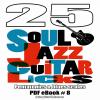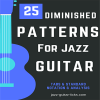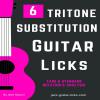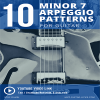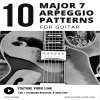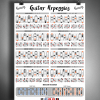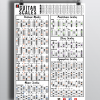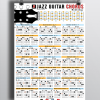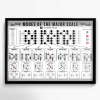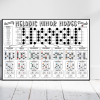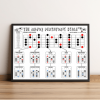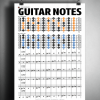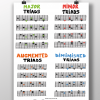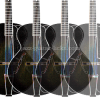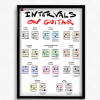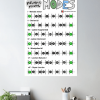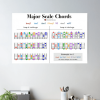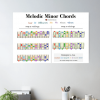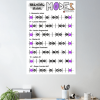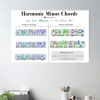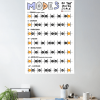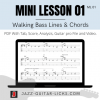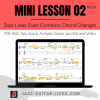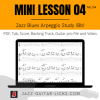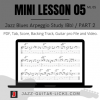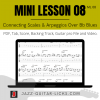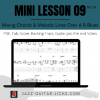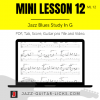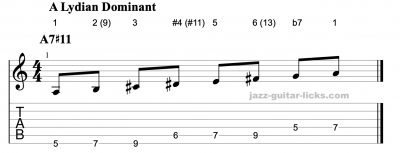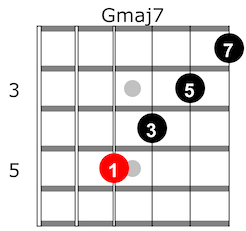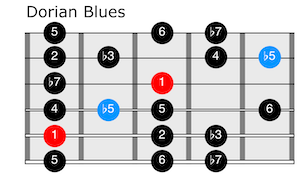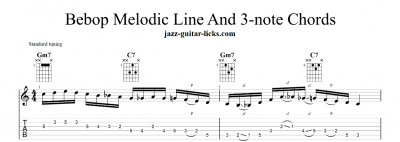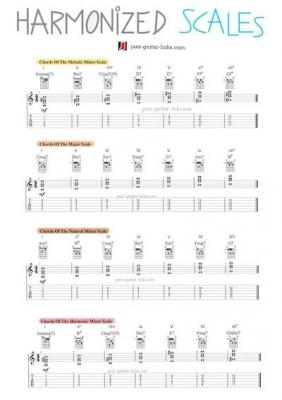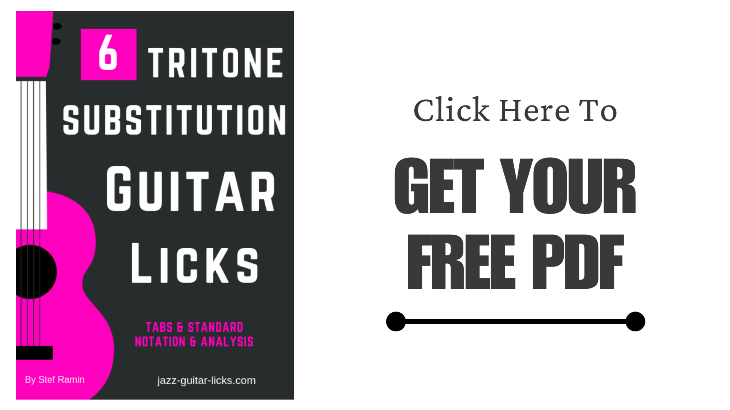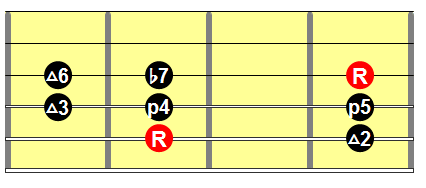
12 Scales To Play Over A Dominant 7th Chord
- By jazz-guitar-licks
- On 2016-08-16
- 0 comments
Dominant chords are pivotal in many styles of music, from blues to jazz and beyond, making it essential for any guitarist to have a repertoire of scales to draw upon when improvising or crafting melodies.
Throughout this tutorial for beginners, we'll explore 12 versatile scale ideas tailored specifically for dominant chords.
What's a Dominant 7 Chord?
The first thing to do before starting exploring the twelve different scales shown in this lesson is to understand how to build a basic dominant 7th chord and what its role is.
A Dominant 7th chord is made up of a root / tonic (1), a major third (3), a perfect fifth (5) and minor seventh (b7). It is one of the most versatile chords.
It is considered as a major chord because of the major third (3).
Indeed, the 3rd tell us if the chord is minor or major. The minor seventh (b7) indicates whether the sound wants to move or not (resolve) to another chord.
Usually dominant chords tend to resolve to a chord down a perfect fifth (or a chord up a perfect fourth).
| C Dominant 7th Chord | C | E | G | Bb |
| Intervals | 1 | 3 | 5 | b7 |
| Related Arpeggio | 1 | 3 | 5 | b7 |
Dominant 7th Chord Basic Guitar Positions
Because it is very important to make the association between scales and chords, you must be able to play several basic dominant 7th chord positions on guitar.
Here are three basic guitar positions that will help you.
These guitar diagrams represent a D7 chord. Please note that the root is the orange note, the minor seventh is the green note and the major third is the note in blue.
The principle is the same for the two other diagrams.
Any jazz guitar student must be able to play these three guitar positions in twelve keys and make the link between them and the scales below.
D7 guitar position 1, root on the sixth string. The black note is the fifth, free to you to play it.
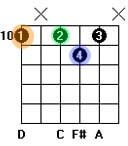
D7 guitar position 2, root on the fifth string. There is no fifth in this diagram, the black note is the octave of the main root.
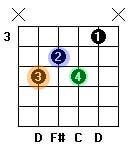
D7 guitar position 3, root on the fourth string. The fifth is the black note.
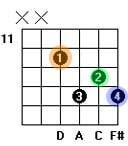
Mixolydian Mode
The Mixolydian scale is surely the most obvious choice when you want to improvise over dominant 7th chords.
It is built with a root (1), second (2), third (3), perfect fourth (4), perfect fifth (5), sixth (6) and minor seventh (b7).
Also called dominant 7th scale, it is the fifth mode of the major scale related to the fifth chord of the harmonized major scale.
Indeed when you stack the 1, 3 , 5 and b7 of the Mixolydian scale you get a dominant 7th chord.
| C Mixolydian Mode | C | D | E | F | G | A | Bb |
| Formula | 1 | 2 (9) | 3 | 4 (11) | 5 | 6 (13) | b7 |
| Intervals | W | W | H | W | W | H | W |
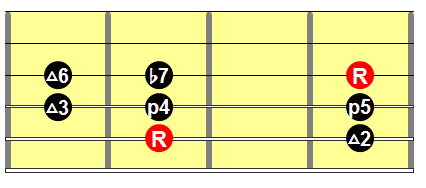
Dominant Bebop Scale
The dominant bebop scale is an eight-note scale (octatonic).
It contains the same notes as the previous Mixolydian mode including a chromatic passing tone, a major seventh (7), between the minor seventh (b7) and the root (1).
Notive that this passing tone should never be played on the downbeat, but preferably on the upbeat.
The chart below shows you how to build the G dominant bebop scale.
You can notice the chromatic passing tone is the yellow note (Bb).
| C Dominant Bebop Scale | C | D | E | F | G | A | B | Bb |
| Formula | 1 | 2 | 3 | 4 | 5 | 6 | b7 | 7 |
| Intervals | W | W | H | W | W | H | H | H |
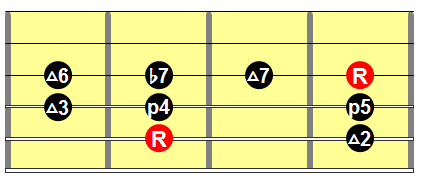
Lydian Dominant Scale
The Lydian dominant scale is the fourth mode of the melodic minor scale.
You can think it as the Mixolydian mode with a raised fourth (#4) or raised eleventh (#11) also used to be called a b5.
As you will have understand, the Lydian dominant scale is designed to work over 7#11 chords or any dominant 7th chord when you want to highlight the #11.
| C Lydian Dominant Scale | C | D | E | F# | G | A | Bb |
| Formula | 1 | 2 (9) | 3 | #4 (#11) | 5 | 6 (13) | b7 |
| Intervals | W | W | W | H | W | H | W |
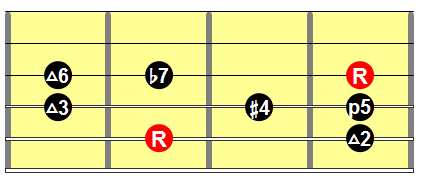
Mixolydian b13 Scale
The Mixolydian b13 or b6 scale is the fifth mode of the melodic minor scale.
In comparison with the Mixolydian mode it has a flat (b6) instead of a natural sixth, hence its name.
Playing this scale over a dominant 7th chord brings a little bit of tension and has a very melancholic sound.
| C Mixolydian b13 Mode | C | D | E | F | G | Ab | Bb |
| Formula | 1 | 2 (9) | 3 | 4 (11) | 5 | b6 (b13) | b7 |
| Intervals | W | W | H | W | H | W | W |
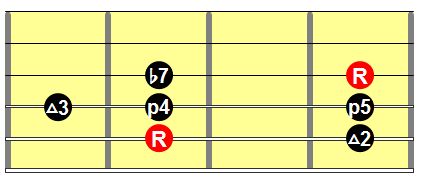
Phrygian Dominant Scale
The Phrygian dominant scale, also called altered Phrygian scale is the fifth mode of the harmonic scale.
It has a very particular sound because of its minor second (b2) and its minor sixth (b6).
This scale can be applied to dominant 7th chords when you want to produce a 7b9b13 sound in your jazz improvisations.
| C Phryian Dominant Scale | C | Db | E | F | G | Ab | Bb |
| Formula | 1 | b2 (b9) | 3 | 4 (11) | 5 | b6 (b13) | b7 |
| Intervals | H | W | H | W | H | W | W |
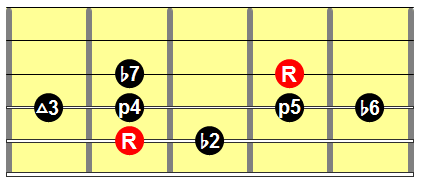
Altered Scale
The altered scale (or superlocrian scale) is the seventh mode of the melodic minor scale.
It contains four altered tones that bring tension, b9,#9, #11 b13, meaning that is can be used over 7#9, 7b9, 7b5, 7#5, 7#11, 7b13 and many other altered chords.
| C Altered Scale | C | Db | D# | E | F# | G# | Bb |
| Formula | 1 | b9 | #9 | 3 | #11 | b13 | b7 |
| Intervals | H | W | H | W | W | W | H |
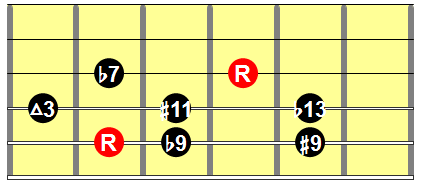
Major Pentatonic Scale
The major pentatonic scale as its name implies, is made up of five notes, it is surely the easiest scale to play over a dominant 7th chord.
It produces a ninth (9) and a thirteenth (13) sound.
| C Major Pentatonic Scale | C | D | E | G | A |
| Formula | 1 | 2 (9) | 3 | 5 | 6 (13) |
| Intervals | W | W | H + W | W | W+H |
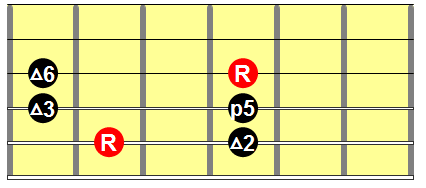
Minor Pentatonic Scale
The minor pentatonic scale is played over dominant 7th chords when you want to bring a blues feel to your jazz lines.
As explained at the beginning of this lesson, dominant 7th chords contain a major third (3) and minor pentatonic scales has a minor third (b3).
Mixing major and minor tonality, the clash of the minor and major thirds, it is that blues thing.
| C Minor Pentatonic Scale | C | Eb | F | G | Bb |
| Formula | 1 | b3 | 4 | 5 | b7 |
| Intervals | W+H | W | H | W +H | W |
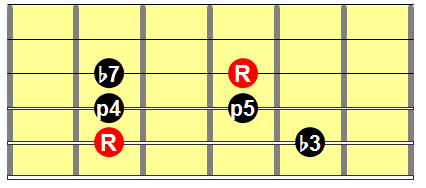
Major Blues Scale
The major blues scale is a hexatonic scale it contains six notes including an added minor third (b3 / b10) between the second (2) and the major third (3).
This is actually the major pentatonic scale with a passing tone.
| C Major Blues Scale | C | D | Eb | E | G | A |
| Formula | 1 | 2 (9) | b3 (b10) | 3 | 5 | 6 (13) |
| Intervals | W | W | H + W | W | W+H |
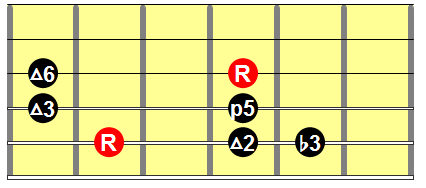
Whole-Tone Scale
The whole-tone scale belongs to the family of symmetric scales, which consist of repeated symmetric intervals.
As its name implies, the whole tone scale is made of a succession of whole tone intervals, the octave is divided in six equal parts.
It contains a raised eleventh (or #11) and a raised fifth (#5) that can bring interesting tensions and funny new colors to your jazz guitar solos.
| C Whole Tone Scale | G | A | B | C# | D# | F |
| Formula | 1 | 2 | 3 | #11 (or #4) | #5 | b7 |
| Intervals | W | W | W | W | W | W |
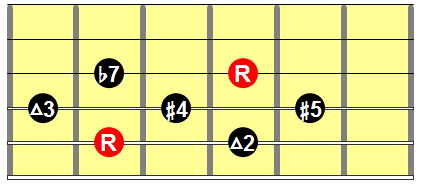
Dominant Diminished Scale
The dominant diminished scale also known as half-tone / whole-tone scale is a symmetric scale built by alternating half-steps and whole-steps.
You can play it over dominant 7th chords, theoretically 7b9 chords, when you want to produce interesting tensions and create outside sounds in your jazz and blues guitar improvisations.
This way you highlight the b9, #9 and #11.
| C Dominant Diminished Scale | C | Db | Eb | E | F# | G | A | Bb |
| Formula | 1 | b9 | #9 | 3 | #11 or b5 | 5 | 13 (6) | b7 |
| Intervals | H | W | H | W | H | W | H | W |
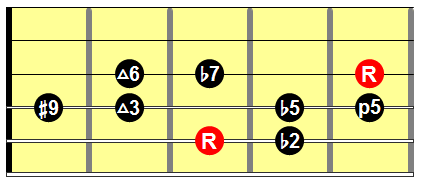
Chromatic Scale
The chromatic scale contains the twelve musical notes where every note is a semi-tone (or half-step) apart.
As you can see in the chart below the chromatic scale has no intervals larger than a semi-tone.
Unlike other scales, it doesn't have chords associated with.
The first approach to familiarize yourself with is to play each consecutive frets, up or down on the guitar.
This symmetric scale is rarely played over an entire guitar solo, but maybe useful when mixed with more conventional dominant scales.
| C Chromatic Scale (ascending) | C | C# | D | D# | E | F | F# | G | G# | A | A# | B |
| Formula | 1 | b2 | 2 | b3 | 3 | 4 | b5 | 5 | b6 | 6 | b7 | 7 |
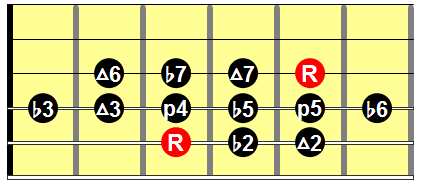
Conclusion
The best way to take the most of this lesson is to experiment each scale by playing them over a dominant 7th backing track.
Try to play them ascending and descending, try to create fluid lines using arpeggios and patterns.
Try to incorporate these lines into common jazz progressions as minor and major II-V-I, blues, turnarounds, bridges.
Remember that playing the corresponding chord after or before playing each scale is an excellent way to develop your musical ear.
-
Guitar Chord Dictionary
This PDF eBook provides over 550 guitar chord shapes. This is the perfect reference guide to understand how chords are built and how to play them on the guitar neck. -
Guitar Scale Dictionary
This E-book is a printable PDF method including over 700 scale diagrams and formula charts for guitarists. -
Harmonized Scales For Guitar
Complete guitar PDF on harmonized scales: major, minor, harmonic and melodic. Includes chord and arpeggio diagrams, charts and practical tabs. -
172 Arpeggio Shapes For Guitar
This printable PDF is a method dedicated to guitarists of all styles who want to learn build and play the most important types of arpeggios. -
126 Triad Chord Shapes
This handbook for guitar players is intended both for teachers and students. It includes 126 guitar shapes for mastering triads. -
Harmonic Major Scale Chords
this PDF offers diagrams and tabs for guitar to learn the chords of the harmonic major scale. -
Major Scale Harmonization
This package provides a printable PDF with exercises and audio files to learn how to harmonize the major scale with 3 note chords and their extensions. -
30 Minor Arpeggio Licks
This package includes a printable PDF method containing 30 exercises with tabs, staves and audio files for practicing minor arpeggios on guitar. -
II V I Bundle - 170 Exercises
This bundle contains 4 PDF methods for a total of 170 exercises with tabs, staves, analysis & audio files for practicing scales, arpeggios licks & chords over the 2-5-1 progression. -
Diatonic Licks Bundle
This package contains 120 jazz guitar lines based on diatonic modes as Mixolydian, Dorian and Ionian. PDF format with tabs, audio files and analysis. -
30 Groovy Jazz Guitar Licks
This downloadable package contains a PDF WITH audio files giving access to 30 groovy guitar phrases mixing jazz, blues and funky licks for beginners. -
30 Smooth Jazz Guitar Licks
In this package you'll get a printable PDF Method with tabs, notation, analysis, scale shapes and audio files for practicing 30 smooth jazz guitar licks. -
40 II V I Jazz Guitar Licks
This pdf method for guitar contains fourteen 2 5 1 jazz guitar lines with tab, standard notation, analysis, scale charts and audio files. -
50 II-V-I voicings
This printable PDF guitar method provides 50 exercises with audio files, analysis, tab and staves for learning major 2-5-1 chord voicings. -
40 Minor 2 5 1 Chord Voicings
This PDF method contains 40 exercices with tabs, scores and audio files for practicing jazz guitar chords over the minor 2 5 1 progression. -
40 Minor II V I Licks
This guitar method is a printable PDF with tabs, diagrams, theory and audio files providing 40 minor 2 5 1 jazz patterns. -
40 Mixolydian Jazz Guitar Lick
PDF guitar method with tabs, audio files and theory providing 40 dominant jazz guitar lines for teachers and students. -
40 Minor Jazz Guitar Licks
This printable guitar method in PDF format contains 40 easy minor jazz guitar lines based on the Dorian mode. -
40 Major Jazz Guitar Licks
Printable PDF eBook method containing 40 major jazz guitar licks with tab, standard notation and audio files for beginners and intermediates. -
Guitar Walking Bass Lines
This jazz guitar method about walking bass lines and chords is available as a PDF files containing 35 exercises with tabs, analysis and audio files -
101 Dominant Arpeggio Patterns
This printable PDF method provides 101 dominant arpeggio exercises with tab, theory and standard notation for the jazz, blues and rock guitarist. -
49 Essential Jazz Lines
This printable eBook method in PDF format provides 49 jazz solo transcriptions of the greatest jazz musicians. Tab, standard notation, audio files & analysis. -
11 Jazz Blues Studies
11 jazz blues chord studies with tabs, standard notation, analysis, and audio recordings and PDF. -
10 Easy Fingerstyle Blues
This PDF with Tabs and audio files provides 10 easy acoustic fingerstyle blues guitar studies for kids and beginners. -
25 Altered Jazz Guitar Lines
This PDF eBook method contains 25 altered jazz guitar licks with tabs, patterns, scale charts and audio files to master, apply and develop the altered scale. -
40 Blues Dominant Patterns
This printable method is available as a PDF file containing 40 easy dominant jazz-blues guitar lines with tabs, standard notation, analysis, audio files and scale charts. -
25 Pentatonic Licks
This jazz guitar method is an eBook available as a PDF with standard notation, guitar tabs, diagrams, analysis, audio files and backing tracks. You will find in this booklet 25 easy jazz guitar lines with theory using common and rare pentatonic scales. -
25 Soul Jazz Guitar Licks
You will find here an eBook available in PDF containing 25 soul jazz and hard bop guitar licks in the style of Grant Green, Melvin Sparks, George Benson. -
25 Diminished Patterns
This eBook PDF with audio files contains 25 dominant diminished jazz guitar patterns using the half-whole diminished scale and diminished 7th arpeggios. -
6 Tritone substitution licks
This Printable PDF eBook available for free download contains 6 easy jazz guitar licks with tabs/notation, youtube video link and analysis about the tritone substitution. -
10 Minor 7 Arpeggio Patterns
This printable PDF eBook offers 10 easy minor 7 arpeggio patterns with its related YouTube video for beginner guitarists. -
10 Easy Major 7 Arpeggio Licks
This is a printable PDF for beginner jazz guitar players providing 10 easy licks to practice major 7 arpeggios. -
10 Chord Melody Lines
Within this package, you'll discover a set of ten chord melody exercises for beginners. Printable PDFaudio files, a backing track, and a link to the associated YouTube video. -
10 Minor Blues Scale Licks
You'll find here a PDF with 10 easy jazz guitar licks to practice the minor blues scale on guitar.
-
Guitar Arpeggios Poster
This giant guitar poster for any guitar player, student or instructor contains colorful arpeggio diagrams. Giant size 24 x 36 inches (60 x 90 cm). -
Guitar Scales Poster 24*36
Guitar posters and wall art with eighteen neck diagrams representing the most used scales in music. -
Guitar Chord Poster
This printed color posters contains 63 guitar chord diagrams for jazz players, students, teachers and schools. -
Guitar Modes Poster
Guitar reference posters and wall art about modes of the major scale for guitar teachers, students and music schools. -
Melodic Minor Modes Poster
Educative and decorative giant guitar poster with neck diagrams, interval names about the seven modes of the melodic minor scale. -
Pentatonic Scale Guitar Poster
This guitar reference poster shows the positions and intervals of the major pentatonic scale. -
Guitar Notes Poster
This is a giant poster showing the notes on the guitar fret board and their positions on a musical staff. -
Triads Guitar Poster
This reference poster show the positions and intervals of the main triads used on guitar. This is a useful tool for guitarists, teacher and students. -
Four Archtop Guitars Poster
This is a decorative poster with four archtop jazz guitars. Several size and colors in landscape format available on Teespring and redbubble. -
Intervals On Guitar - Poster
This giant poster for guitar provides neck diagrams with interval positions. -
Melodic Minor Modes
This music theory poster available in several sizes shows the construction of the seven modes of the melodic minor scale. -
Major Scale Chords
This handy poster provides a clear visual guide to the chords built from the major scale, helping you recognize patterns and improve your playing. -
Melodic Minor Chords
Explore the rich harmonic possibilities of the melodic minor scale with this essential guitar poster. -
Harmonic Minor Modes
This music theory poster, offered in various sizes, demonstrates the structure of the seven modes of the melodic minor scale. -
Harmonic Minor Chords
Discover the chords of the harmonic minor scale with this guitar poster. -
Major Scale Modes
This poster is created for music teachers and students, illustrating the structure of the seven modes of the major scale.
-
Mini Lesson 01 (ML 01)
You'll find a mini guitar lesson about walking bass lines and chords containing a PDF with tab, score analysis, shapes, a video and a guitar pro file. -
Mini Lesson 02 (ML 02)
In this mini jazz guitar lesson you will learn how to play easy and cool jazz lines over basic chord changes found in jazz. Pdf, tab and video included. -
Mini Lesson 03 (ML 03)
With this short lesson you will learn how to play and connect basic guitar arpeggios over a diatonic chord progression. -
Mini Lesson 04 (ML 04)
This is a downloadable package with PDF, Tab, guitar pro file and video to practice guitar arpeggios over a jazz blues chord progression. -
Mini Lesson 05 (ML 05)
This downloadable package provides a PDF with Tab/score, a guitar pro file and a short video for practicing guitar arpeggios on a jazz blues progression in Bb. -
Mini Lesson 06 (ML 06)
This package for guitarists contains a PDF with tab, video, backing track and guitar pro file for practicing arpeggios over a basic jazz blues progression. -
Mini Lesson 07 (ML 07)
With this mini guitar lesson you will learn how to superimpose arpeggios over a diatonic chord progression. Video, pdf, jamtrack and guitar pro file included. -
Mini Lesson 08 (ML08)
Mini lesson with PDF, guitar pro file, video and backing track for practicing scale and arpeggio connections over a Bb jazz blues progression. -
Mini Lesson 09 (ML09)
This mini lesson is a downloadable package containing a PDF, video, backing track and guitar pro file of a jazz blues progression study in B. -
Mini Lesson 10 (ML 10)
This mini guitar lesson provides a printable PDF with tab/notation, video, backing track and guitar pro file for practicing open triads over Fly Me To The Moon. -
Mini Lesson 11 (ML 11)
This guitar lesson is a package inlcuding a PDF transcription with analysis, a short video, a backing track and a guitar pro file to learn to play jazz solo lines over Blue Bossa. -
Jazz Blues Guitar Study (ML12)
This mini lesson provides a video, a guitar pro file and PDF transcription of a jazz blues study in G implying melodic lines, chord extensions and substitutions
scales guitar scales diminished scales dominant 7th scales jazz lesson jazz guitar jazz guitar improvisation jazz guitar lesson dominant scales
Add a comment
